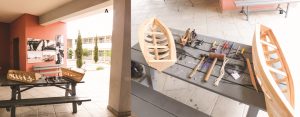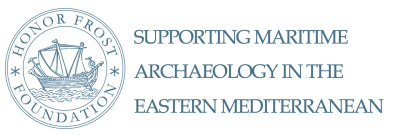The Intangible Maritime Cultural Heritage Project educational programme - 2021
Maria Ktori
 Maritime Cultural Heritage transcends the limits of the sea realm, including both tangible and intangible cultural elements. Traditional crafts, which are directly related to the sea and its people, are an intangible element being transmitted from one generation to another. Crafts like shipbuilding produce objects (e.g. vessels) which in turn are tangible cultural elements. Maritime professions are very good example of the convergence of tangible and intangible cultural heritage, which is further expressed in vessels, tools and human activities taking place in an aquatic environment.
Maritime Cultural Heritage transcends the limits of the sea realm, including both tangible and intangible cultural elements. Traditional crafts, which are directly related to the sea and its people, are an intangible element being transmitted from one generation to another. Crafts like shipbuilding produce objects (e.g. vessels) which in turn are tangible cultural elements. Maritime professions are very good example of the convergence of tangible and intangible cultural heritage, which is further expressed in vessels, tools and human activities taking place in an aquatic environment.
The Intangible Maritime Cultural Heritage Project began in 2016, as a small-scale project aiming to record vernacular shipbuilding in Cyprus. It has since developed considerably due to the wealth of information recorded and the material culture itself. The project focuses on the vernacular maritime professions (e.g. shipbuilding, fishing, sponge diving, making sails) and the role of traditional craftsmen in their communities. Our main goals are to record each craft and create educational material for children and adults, as the primary means of understanding, preserving and promoting our heritage.
The goals for the 2020-2021 research period were to complete the documentation of the Turkish-Cypriot shipwrights and shipbuilding hubs across the northern coastline, to research the collections of historical documents in Cyprus and abroad (UK, Turkey), to locate relevant material available in Cypriot photographic collections, and, ultimately to design and implement an educational programme for students aged 10-12 years old. The ongoing coronavirus pandemic forced us to revise these plans almost entirely, due to four lockdowns, overall health and safety concerns, and the rather restrictive measures taken by the government to limit the spread of the virus. As a result, it was possible to document maritime activities at only five locations along the northern coastline, before diverting our efforts on historical research, data collection related to artworks and photographs, and data analysis. The project leader performed two pilot workshops with 4-5 participants in order to revise our educational programme according to the health measures in place. The revised workshop format was proven to be ineffective, and as the Ministry of Education, Culture, Youth & Sport suspended school activities several times and switched to e-learning, it became evident that we had to forgo in-person activities and focus on digital education as well. Despite the setbacks, the team was able to explore foreign historical archives through their online catalogues, review more than 2000 folders (in person) at Cypriot public and private archives, and, collect all data concerning maritime professions from artworks, photographs, and, videos. The ongoing data analysis fuelled three peer-reviewed publications, while a few more are in preparation.
Visit the project Facebook page here
